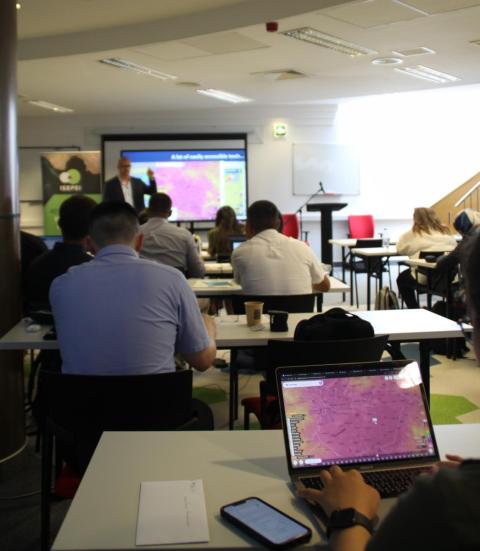GeoHub's 2024 Summer Workshop Commences: WMO Emphasizes Urgent Need for Global Early Warning Systems

Our regular summer workshop on the promotion of the application of geospatial technologies and remote sensing in various environmental domains commences this week at CEU. 2024’s course on “Geospatial Technologies for Monitoring SDGs – Early Warnings for All” kicked off on July 22 in Budapest, bringing together a diverse group of participants.
In the opening presentation at the workshop, Natalia Donoho, Head of the World Meteorological Organization's (WMO) Space Systems and Utilization Division, highlighted the critical importance of the Early Warnings for All (EW4All) initiative. The presentation underscored the urgent need for comprehensive early warning systems in the face of escalating climate-related disasters.
Climate Change Intensifies Global Risks
Donoho opened with stark statistics, noting that 3.3 to 3.6 billion people currently live in contexts highly vulnerable to climate change. She emphasized that disasters are projected to increase by 40% before 2030, with extreme weather events becoming more frequent and intense. The WMO's State of Global Climate report confirmed 2023 as the hottest year on record, with unprecedented ocean heat, sea level rise, and glacier retreat.
Early Warnings for All Initiative
The EW4All initiative, part of the UN Secretary-General's Acceleration Agenda, aims to address these challenges by ensuring every person on Earth is protected by early warning systems within five years. Donoho stressed that a 24-hour warning of an impending hazardous event can reduce resulting damage by 30%, potentially saving billions of dollars annually.
Current Global Coverage and Disparities
Despite the proven benefits, Donoho revealed significant gaps in early warning system coverage:
- Only 65% of the world's population is currently covered, mainly in OECD countries.
- Less than 50% coverage in Least Developed Countries (LDCs).
- About 40% coverage in Small Island Developing States (SIDS).
- Approximately 45% coverage in Africa.
These disparities are particularly concerning as hazards in Africa, South Asia, South and Central America, and small island states are 15 times more deadly than in other regions.

European Challenges
Focusing on Europe, Donoho noted that it is the fastest warming of all WMO regions, facing more frequent summer heatwaves and increasing severity of extreme events. A collaborative effort is needed to develop a comprehensive, cutting-edge Multi-Hazard Early Warning System in Southeast Europe, facilitating data exchange and partnerships for continuous improvement and effective disaster mitigation.
Bridging the Gap
The presentation concluded by outlining key challenges in implementing global early warning systems:
- Need for greater understanding of disaster risks and potential impacts.
- Lack of data on socioeconomic benefits of multi-hazard early warning systems (MHEWS).
- Ensuring warnings reach and are understood by all at-risk populations.
- Integrating MHEWS into national legislative frameworks.
- Providing support for countries in MHEWS implementation.
As climate-related disasters continue to escalate, the WMO's presentation at the Budapest Summer Course serves as a crucial call to action for global cooperation in developing and implementing comprehensive early warning systems to protect vulnerable populations worldwide.
Annually hosted at CEU, the Summer University course is part of Syslab's ISEPEI project workshop series titled "Bridging ICTs and the Environment." The course aims to bridge the gap between developers and practitioners by offering in-service training focused on honing skills in Satellite imagery, GIS, mobile applications, and other technologies for data-driven decision-making and achieving SDG targets. Since 2014, this workshop has collaborated with various UN agencies (UNDP, UNECE, UNEP, UN FAO, UNFPA, UNOOSA,) and digital technology stakeholders (JRC, Airbus, Esri, Google, MAXAR). This year's workshop brings together around 30 participants from around the world, creating an impactful platform for networking and forging professional connections to drive collaborative environmental and food security projects on a global scale.